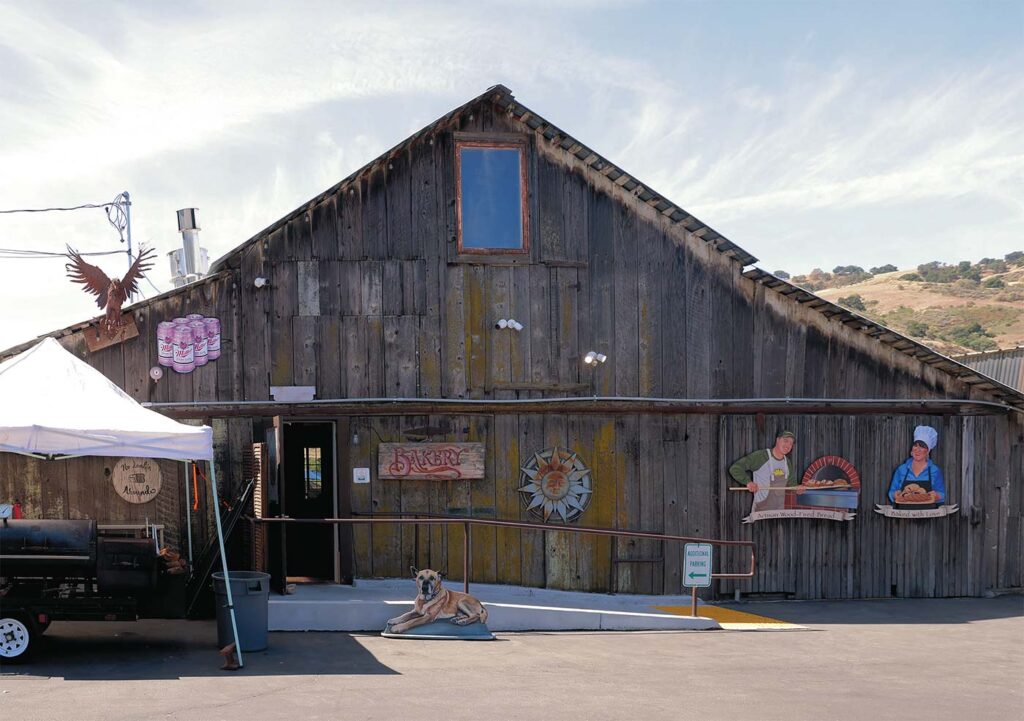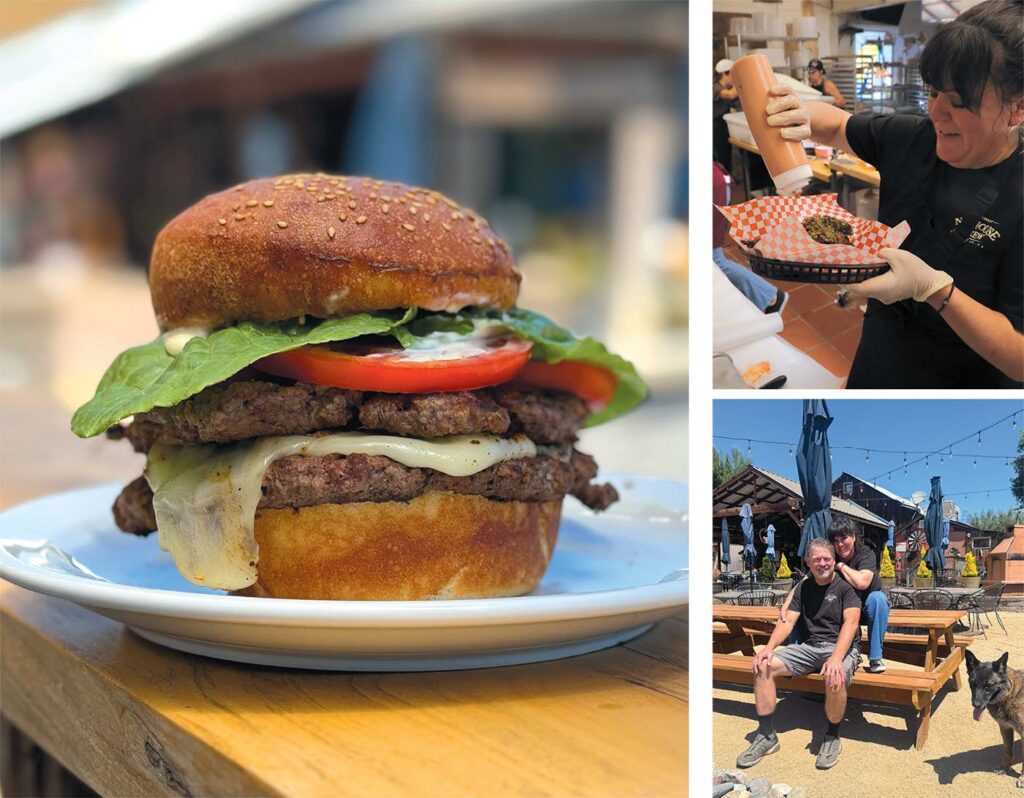
A rare combo—handbuilt barn + orchard + earnest beer + great bread— makes a leap in San Benito County
By the time the gates leading to the Suncoast Organic Farm open at noon, the entry road is already filled with cars, with more circling Hollister’s Southside Road for a chance to get in line.
The stream of lunchtime customers continues until closing at 5pm, with the small staff trying to keep up with the orders for smashburgers, pulled pork sandwiches and apricot cobbler. “Welcome to the nuthouse!” shouts co-owner David Jensen as he stirs the french fries bubbling away in a vat of beef tallow. If he is tired, he does not show it, though he’s been up since 4am, baking the day’s bread. They serve 247 burgers and 140 pulled pork sandwiches. Although they experience some glitches, none of the diners seem bothered. They are happy just to relax on the patio of the brewery-bakery, taking in the nearby corral filled with whimsical animal figures against a backdrop of rolling hills.
“I would come just for the atmosphere,” says Tina Hernandez, who ordered the Big Daddy, a double burger with apple-smoked bacon. “The people are always kind, the food is always delicious and it’s just beautiful out here.”
The biweekly lunches are in addition to Suncoast’s weekly drivethrough pickups. Online orders can be placed from a rotating menu that includes specialty sourdoughs such as country leaven, jalapeño cheddar, and cheese-and-onion, made with Suncoast’s Nuthouse Ale. Other sweet treats, like churro croissants, blueberry braids and assorted gelatos, also prove popular.
The sit-down sandwich events, which began on April 12, are a nod to the twice-weekly offerings available before the pandemic. They’re also another step in the controlled expansion of a business that has a growing reputation as one of San Benito County’s best out-of-theway culinary destinations.
People are drawn to Suncoast by more than the setting conjured by 400 olive trees. Everything is fresh, everything is organic. Whatever they can’t source from their own land, they get from nearby farms like Pinnacle, Coke and Swank. The bread is sold the morning it is baked, and it is hard to imagine an intriguing grain they have not used yet, including amaranth, ryeberries and Blanco Grande wheat berry.
Suncoast’s origin as a bakery happened almost randomly in 2008, when Lisa Miller left her career in radio to spend more time with her 7-year-old son. She joined her stepfather, Gary Miller, in selling olive oil at the Mountain View farmers market and began wondering how to build the business.
She toured several bakeries, but was most impressed by Miller’s Bake House in Chico, where she watched owner Dave Miller (no relation) grind flour on a stone mill to make his bread. He sold only at farmers markets, and to Lisa that seemed like a sound business model.

The first step was to convert an old barn on her stepfather’s property into a fully commercial kitchen, using a blueprint sketched out on graph paper. According to Lisa, the building was barely standing, and it took three years of hard work to complete the restoration.
The next hurdle was to learn how to use the Mugnaini wood-fired oven. She knew nothing about baking when she started, and many a charred-bread briquette was tossed before she was able to submit a success to the California Association of Farmers Markets.
“When I decided on baking, I wanted to do it old school,” she says. “I wanted to be authentic like ‘Little House on the Prairie.’ But they don’t tell you how much knowledge and labor are involved!”
Lisa found an able partner in David Jensen, her match in terms of work ethic and culinary excellence, and they married in 2009. Jensen learned to bake as a kid living in Kathmandu with his diplomat father, and, being remarkably handy at everything he does, managed to find time between batches of bread and beer to build the couple’s home.
The couple purchased a grain mill crafted from North Carolina granite, which Lisa says is one of the keys to Suncoast’s success in terms of flavor and nutrition. According to Lisa, using a steel rolling mill to crush the wheat releases an acid which, within 72 hours, makes baked goods dead. A stone mill keeps all the nutrients in flour for up to six months.
“It’s kind of like having live bread,” she says. The first major change in the business occurred in 2011, when a rainout at the farmers market resulted in a large amount of unsold inventory. Local fans and market customers flocked to the barn after a Facebook post, buying up the entire inventory.
Sensing an opportunity, they started selling at both locations until they hit a breaking point one day: They sold so much at the barn that they had no inventory to take to the market.
“We were working so much that we felt unhealthy,” Lisa says. The solution: Selling on premises exclusively on Fridays and Saturdays. Having the barn as their base of operations allowed them to expand their menu to include turkey avocado sandwiches, veggie wraps, tri-tip sandwiches, pizza and desserts. It also enabled better quality control and avoided some of the costs associated with going to market, which meant lower prices for their customers.
The private wells and solar panels also help keep costs down, as does sourcing ingredients from the 120 fruit trees on property.
In 2016, Jensen expanded into beermaking, producing his Nuthouse Brew on-site. That helped keep customers around later in the evening. “We were looking for a way to grow the business, and a brewery was an ideal fit,” Jensen says.
Jensen now has four seven-barrel fermentors and three 14-barrel fermentors—enough, he says, that he “could supply Hollister with beer.” His current beers include Cascade Crush, made with Cascade Hops and Two-Row grain; American Ale, based on Victory malt and featuring Nugget, Cascade and Centennial hops; and Tropical IPA, which features Vista, Citra and Mosaic hops. Most of the hops used in the beers are grown on-site, and the grains are milled there too.
One of the crucial components of the baked and brewed goods is the water drawn from the two wells on the property. It’s chlorine free, has a high calcium content and a pH of almost 8.5, which is adjusted for brewing with a reverse osmosis system that allows them to match the water profile to its intended uses.
Meanwhile the wells are powered by an array of 65 solar panels, as are the refrigeration units, the glycol chillers, a soon-to-be-built walkin freezer and their residence.
The wells and panels also help keep costs down, as does sourcing their own ingredients from the 120 non-olive trees on the property, including apples, plums, figs, oranges, lemons, limes, chestnuts and kumquats. Much of the produce comes from an outdoor garden and a greenhouse that grows berries, tomatoes, corn, peppers and more. Lisa believes access to the freshest organic ingredients honors her stepfather Gary’s philosophy of offering only the most splendid possible products to the community.
“We want to be the best in everything we do,” Lisa says. “People say, ‘You guys do everything,’ but it’s out of necessity… With us, it’s always about quality.”
About the author
Robert Eliason is a documentary photographer and photojournalist and has been based in San Juan Bautista for the last 12 years. Recently he has been doing extensive reporting on the wineries, breweries and specialty food companies of San Benito County, and is documenting the history of the Cienega Valley wine region.
- Robert Eliasonhttps://www.ediblemontereybay.com/author/kfeldmanklein/
- Robert Eliasonhttps://www.ediblemontereybay.com/author/kfeldmanklein/
- Robert Eliasonhttps://www.ediblemontereybay.com/author/kfeldmanklein/
- Robert Eliasonhttps://www.ediblemontereybay.com/author/kfeldmanklein/



